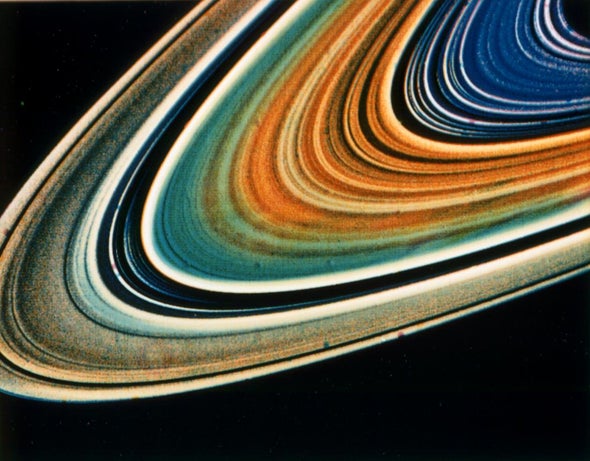(单词翻译:单击)
听力文本
This is Scientific American's 60-second Science. I'm Karen Hopkin.
When it comes to Saturn, it's the rings that render the planet instantly recognizable. But it turns out that Saturn was not always so elaborately adorned. Data from the final orbits of the Cassini mission indicate that Saturn's rings were a relatively recent addition...forming a scant 100 to 10 million years ago. The findings are in the journal Science.
During what's been called the "grand finale" phase of the Cassini mission, the spacecraft repeatedly dove through the gap between the top of Saturn's clouds and the innermost edge of its rings. These flybys allowed researchers to separate the gravitational effects of the planet and its accessories...which led to a more precise measurement of the rings' mass.
"Their mass was the missing piece of the puzzle to determine their age."
Daniele Durante, a postdoc at Sapienza University in Italy, who analyzed the data.

"The rings are made up mostly of ice with a small fraction of impurities. About one or two percent of the total rings' mass. These impurities consist of rocky material coming from outer space. Since these impurities are accumulated over time, these allow us to relate the total mass of the rings with their age."
Durante and his colleagues found that Saturn's bling has a combined mass of about one-and-a-half to two times 10 to the 19th kilograms...that's less than half the mass of its smallest moon. And when they crunched the numbers, the data suggested an age of no more than 100 million years. To put that in context, remember, dinosaurs roamed the earth from about 200 million years ago until 65 million years ago. And Saturn itself, like planet Earth, formed early in the life of the solar system, about 4.5 billion years ago.
"Therefore, the ring's formation came long after that of the planet."
The youthful accoutrement might have come from a captured comet or a pulverized moon. But no matter how they were made, the rings really do make Saturn a solar system standout.
Thanks for listening for Scientific American — 60-Second Science. I'm Karen Hopkin.
参考译文
这里是科学美国人——60秒科学。我是凯伦·霍普金。
说到土星,其光环令人们一眼就能认出这颗行星。但事实证明,土星并非一直如此“精心装扮”。卡西尼号任务的最终轨道数据表明,土星光环是相对较新的附加物,大约形成于1亿到1000万年前。研究结果发表在《科学》期刊上。
在被称为卡西尼号任务的“壮丽终章”阶段,这艘宇宙飞船反复在土星云层顶端和土星环最内侧边缘之间的空隙穿梭。这些飞越让研究人员得以分离土星及其附属物的重力效应,从而更精确地测量出土星环的质量。
“土星环的质量是确定其年龄的缺失线索。”
意大利罗马大学的博士后达尼埃尔·杜兰特分析了这些数据。
“这些光环主要由冰和少量杂质构成。大约占光环总质量的1%或2%。这些杂志包括来自外层空间的岩石物质。由于这些杂质是随时间而累积的,因此我们可以将光环总质量与其年龄联系起来。”
杜兰特和同事发现,土星闪耀光环的总质量约为1.5到2乘以10的19次方千克,这一质量不到土星最小卫星的一半。当他们运算这些数字时,数据显示土星环的年龄不超过1亿年。联系背景来看,要记住,从2亿年前至6500万年前,恐龙一直在地球上漫步。而土星本身与地球一样,形成于45亿年前的太阳系生命初期。
“因此,土星光环的形成时间远远晚于土星的诞生时间。”
土星年轻的“装扮”可能来自被捕获的彗星或粉碎的卫星。但无论形成方式如何,土星光环的确令土星在太阳系中脱颖而出。
谢谢大家收听科学美国人——60秒科学。我是凯伦·霍普金。
译文为可可英语翻译,未经授权请勿转载!
重点讲解
重点讲解:
1. when it comes to 谈到,涉及;
Each nation has its own peculiarities when it comes to doing business.
谈到做生意,各国都有其独特之处。
2. be made up of 由…组成;
Common salt is made up of 40% sodium and 60% chloride.
食盐由40%的钠和60%的氯化物构成。
3. consist of 由…组成;由…构成;
The committee consists of ten members.
委员会由十人组成。
4. no matter 不管…;无论…;
No matter what your age, you can lose weight by following this program.
不论年龄多大,都可以按这套方案来减肥。


